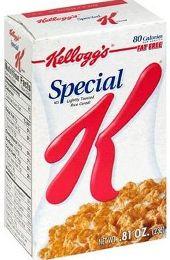 Authorities in Britain have banned the Kelloggs 'Special K' advertisement for 'misleading women' about the calorific value of a typical bowl of the breakfast cereal.
Authorities in Britain have banned the Kelloggs 'Special K' advertisement for 'misleading women' about the calorific value of a typical bowl of the breakfast cereal.
The advertisement by Kellogg's boasted that eating one bowl of the corn flakes would add only 114 calories to a person's diet without excluding the calories of the milk, which could add anything from 86 to 122 calories, the Daily Mail reported.
The cereal has been promoted to generations of women across the globe on the basis that it helps to lose weight, as part of a calorie-controlled diet.
However, in reality it contains a relatively high amount of sugar compared to other cereals -- double the level in cornflakes and three times that of Weetabix, the other such product in the market.
The US company has been found to have flouted advertising rules in a TV commercial which featured
a number of women preparing breakfast.
While the women buzzed around the kitchen, it featured a close-up of milk being poured over a bowl of Special K.
At the same time, a voice-over stated: "We women know how to get the most out of our mornings. Like enjoying a delicious bowl of Special K at 114 calories."
"114 Kcals and 0.6g fat per 30g serving. Enjoy as part of a healthy balanced diet & active lifestyle," the text on the screen stated.
The Advertising Standards Authority received a complaint it was misleading because it failed to include the milk calories.
Kellogg's said it had left out the figure for milk because many customers eat the cereal dry, or with orange juice or yogurt.
It said the issue was further complicated because there are many types of milk with different fat and calories counts.
But the ASA said the commercial should have made clear that the claims did not include the calories that would come from milk.
© Copyright 2025 PTI. All rights reserved. Republication or redistribution of PTI content, including by framing or similar means, is expressly prohibited without the prior written consent.

 Authorities in Britain have banned the Kelloggs 'Special K' advertisement for 'misleading women' about the calorific value of a typical bowl of the breakfast cereal.
Authorities in Britain have banned the Kelloggs 'Special K' advertisement for 'misleading women' about the calorific value of a typical bowl of the breakfast cereal.